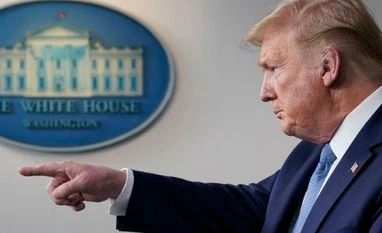President Donald Trump on Sunday extended his stay-at-home guidelines until the end of April, dropping a hotly criticized plan to get the economy up and running by mid-April after a top medical adviser said more than 100,000 Americans could die from the coronavirus outbreak.
The reversal by Trump, which he said would be disclosed in greater detail on Tuesday, came as the U.S. death toll topped 2,460 from the respiratory disease, according to a Reuters tally, with more than 141,000 cases, the most of any country in the world.
"The peak, the highest point of death rate, is likely to hit in two weeks," Trump told a coronavirus briefing in the White House Rose Garden, flanked by top advisers and business leaders, "Nothing would be worse than declaring victory before the victory is won."
He told Americans: "The better you do, the faster this whole nightmare will end."
Earlier on Sunday, Dr. Anthony Fauci, director of the National Institute of Allergy and Infectious Diseases, told CNN that the pandemic could ultimately kill between 100,000 and 200,000 people in the United States if mitigation was not successful.
Since 2010, the flu has killed between 12,000 and 61,000 Americans a year, according to the U.S. Centers for Disease Control and Prevention. The 1918-1919 flu pandemic killed 675,000 in the United States, according to the CDC.
Fauci softened his dire predictions at the Rose Garden briefing, saying they were based on models that were run to show the worst-case scenario if Americans did not follow stay-at-home directives.
"We feel the mitigation we are doing right now is having an effect," Fauci said. "The decision to extend this mitigation process until the end of April is a wise and prudent decision."
Trump's surprise suggestion that he might order the reopening of the economy by Easter had been greeted with sharp and immediate criticism from state governors still grappling with rising numbers of patients and health systems stretched thin.
The governors of at least 21 states, representing more than half the U.S. population of 330 million, have closed "non-essential businesses" and told residents to stay home.
Asked during the briefing if floating the idea of lifting restrictions by mid-April had been a mistake, Trump called it "just an aspiration" and said he now believed the country could be on its way to economic recovery by June 1.
'WE ARE SCARED'
New York state on Sunday reported nearly 60,000 cases and a total of 965 deaths, up 237 in the past 24 hours. The number of hospitalized patients was slowing, said Governor Andrew Cuomo, a Democrat who has been outspoken in his criticism of the Republican president.
New York City will need hundreds more ventilators in a few days and more masks, gowns and other supplies by April 5, Mayor Bill de Blasio told CNN.
New Orleans will run out of ventilators around Saturday, Louisiana Governor John Bel Edwards told CBS.
Ventilators are breathing machines used to treat those suffering the most severe symptoms from the pneumonia-like respiratory ailment and many hospitals fear they will not have enough.
Dr. Arabia Mollette, an emergency medicine physician at Brookdale University Hospital Medical Center in Brooklyn and St. Barnabas Hospital in the Bronx, said she now worked in a "medical war zone."
"We're trying to keep our heads above water without drowning," Mollette said. "We are scared. We're trying to fight for everyone else's life, but we also fight for our lives as well."
Maryland arrested a man who repeatedly violated the ban on large gatherings by hosting a bonfire party with 60 guests, Governor Larry Hogan said on Sunday.
Michigan Governor Gretchen Whitmer, whose state has become one of the fastest-growing areas for the coronavirus, especially in the county that includes Detroit, called the rapid spread "gut-wrenching."
"We have nurses wearing the same mask from the beginning of their shift until the end, masks that are supposed to be for one patient at one point in your shift. We need some assistance and we're going to need thousands of ventilators," Whitmer told CNN.
The strict stay-at-home rules meant that usually bustling New York, like many major cities in the United States, was largely quiet on Sunday except for the sound of ambulance sirens.
"It feels very apocalyptic," said Quentin Hill, a 27-year-old New Yorker who works for a Jewish nonprofit. "It almost feels like we're in wartime."
Jason Brown, who was laid off from his job in digital media due to the pandemic, said Fauci's estimate was scary.
"I feel like it's just growing, growing, growing," said Brown, who is 27 and lives in Los Angeles, one of the epicenters of the outbreak.
"There's no vaccine. It seems like a lot of people don't take it seriously in the U.S., so it makes me believe that this would become more drastic and drastic," Brown said.
Unlock 30+ premium stories daily hand-picked by our editors, across devices on browser and app.
Pick your 5 favourite companies, get a daily email with all news updates on them.
Full access to our intuitive epaper - clip, save, share articles from any device; newspaper archives from 2006.
Preferential invites to Business Standard events.
Curated newsletters on markets, personal finance, policy & politics, start-ups, technology, and more.
)